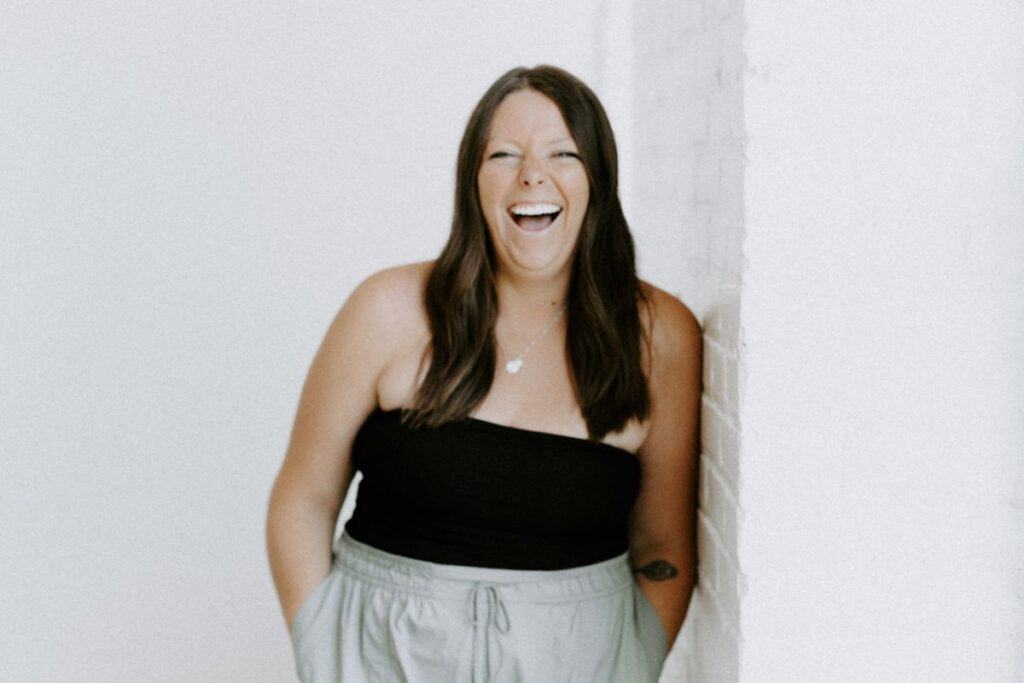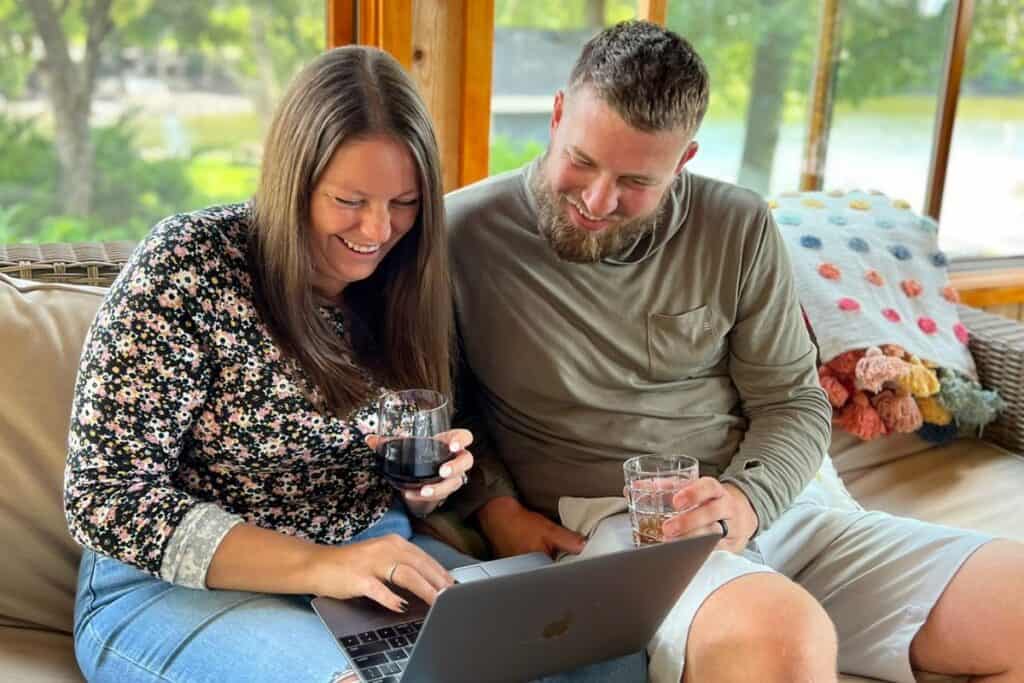Money Dates: How to Talk about Money with Your Partner
Welcome back to Financial Self-Care with Financial Therapist, Lindsey. I’m your host, Lindsey Konchar and today we are talking about Money Dates. What is a money date? How to talk about money with your partner? How to talk to your spouse about money without fighting? And just generally, financial planning for couples.
And for all my single ladies out there, you can and should be having solo money dates. I’m going to be addressing this as though I’m approaching couples, but believe me, everything is applicable to getting yourself on track, too.
You can listen to this Money Dates episode on my podcast, Financial Self-Care with Financial Therapist, Lindsey on Apple Podcasts, Spotify, or wherever you like to listen!
What is a Money Date?
On to the post! Money dates. A money date is scheduled time to talk about your dreams, desires, and goals and make a financial plan to accomplish those things and live a beautiful life.
I love money dates because, despite what your grandparents – and even parents – said, talking about money isn’t taboo; it is not tacky. In fact, money dates and talking about money is a sign of a good, healthy, functioning relationship.
Yet, in a 2023 report titled: Everyday Wealth in America, researchers say only, “[. . .] 37% of couples have detailed discussions surrounding their financial goals” and “[. . .] about 1 in 5 say unhealthy money issues are a threat to their relationship.”
Perhaps most alarming, the report tells us, “50% of [couples] in their 40s and 50s admit their partner doesn’t know everything about their spending.”
Depending on the severity of the situation, this can be financial infidelity.
Financial infidelity is a topic we’ll discuss in-depth in a later post. But the essence of financial infidelity is this: One person in a partnership lies to the other about money. And yes, lying by omission is certainly encompassed in this definition.
Financial infidelity might include lying about or hiding debt, omitting income, or secretly making large, discretionary purchases without consulting their partner.
Again, financial infidelity is a really important topic and one that we’ll come back to a different day.
The initial report goes on to say:
“[. . .] although we’ve seen that finances can be a source of conflict in a relationship, a whopping 83% of couples say talking about finances more can help resolve disagreements. In fact, those who discuss finances in detail are twice as likely as those who only discuss it in passing to report that their relationship has never been stronger.”
But the problem is, most couples – even if they want to talk about their money more often and in a healthier way – don’t know how to do so.
And that’s where I come in.

How to Talk about Money with Your Partner
The very first thing I want you to do is think about whether or not you and your partner have had any fun conversions about money. And yes, I really do mean fun.
Money dates don’t always have to be about the numbers. In fact, they absolutely should not be all about the numbers. And that’s why, as with all things I do, we start with your North Stars – your dreams, desires, and goals.
This is the best place to start because it’s the lowest barrier to entry. Who doesn’t like dreaming up a beautiful life with their partner?
Sometimes I just daydream about sitting at a bistro table in Portugal, drinking a Port Wine next to my husband, while watching our kids run around the plaza. And sharing that dream – getting even more clear on the vision – with AJ is one of my favorite ways to spend an evening.
Off the cuff, that might not seem like a money date, but of course it is. I know that one day, my Portugal Dream is going to happen. But how do you think I’m going to get there?
First, by having the dream. Next, telling my husband about the dream (and making sure he’s on board). Third, making a plan to make the dream come true. And making that plan includes making a financial plan.

So, we start with North Stars. We call them North Stars because they are your guiding lights for how you are going to make financial decisions.
Plus, until you do this, you and your partner are going to continue to be on two different ships.
Right now, one is sailing east and the other is sailing west. But you need to be on the same ship, sailing the same direction, with your North Stars guiding your way. And the very first step of that, is knowing where you want to go. And so, you gotta talk about it.
When making your North Stars, I want you to get out of the day-to-day grind. I want you to start picturing your big, full, long life.
I tell my clients this all the time. When most people start working on their money stuff, they get really bogged down in examining every line item on their credit card statement. And that part certainly can be important. But when you can zoom out and plan more of your life and really get clear on why you’re doing what you’re doing, that’s when intentional spending and saving happens.
We’re breaking down your North Stars into three categories. Short-term, mid-term, and long-term.
Short-Term Financial Goals (+ Examples)
First, ask yourself what do you want to accomplish in the next two years? Those are your short-term North Stars. Examples of this might include:
- Get out of (and stay out of) high-interest debt
- Do an audit of how many subscriptions you have (and cancel the ones you don’t need or use)
- Analyze your grocery spending and see where you can cut costs
- Go full-time in your side hustle
- Dream up a job you really want
- Spend money without guilt
- Start investing
- Go on a family cruise
Remember, every dream, desire, and life goal you have is a financial goal. Nothing is off the table here. And you’re just dreaming. So make it fun.
Mid-Term Financial Goals (+ Examples)
Next, think about what you want to do in the next 2 to 10 years. Those are your mid-term North Stars. This might be things like:
- Buy a house
- Have no car payment
- Earn $150,000 per year
- Have $100,000 invested
- Start annual vacations as a couple, no kids allowed
Long-Term Financial Goals (+ Examples)
And finally, your long term North Stars. That’s anything you want to do in 10 or more years. Things like:
- Help pay for your kids’ educations
- Be mortgage-free
- Retire at 65-years-old
- Take an epic two month vacation across southeast Asia
Again, these are just ideas. You might hate all of them. You might love them. Either way, I want you to dream up your own life – your own partnership. No judgment. Just fun. The more specific and actionable, the better. But if you’re brand new to this, a high level overview is great.
Money Dates: Example 1
This is of my very favorite ways to have a Money Date. I’ll warn you – it’s not right for everyone.
But last year, my husband and I had a really heavy-on-the-numbers Money Date. We were really honing in on our semi-retirement plan, and needed to get all our ducks in a row. But AJ really doesn’t love the numbers. Spreadsheets are not his love language.
A “No-Numbers” Money Date
So the next month, I decided we needed a no-numbers Money Date. One afternoon, I told him, I’m going to stop at the gas station and grab a few scratch offs. After the kids go to bed, we’re going to pour our favorite drinks, and talk about what we would do with a sudden influx of cash.
I told him to think about what we would do if we won $10,000, $100,000 or $1,000,000.
About 4 hours later, we were having our date, and it was so fun!
We don’t have any debt aside from our house, so with $10,000 we both agreed we would put half in investments. $3,000 of it would go to a family vacation. He would get $1,000 and I would get $1,000 to put into our individual, shame-free spending accounts.
(AKA I would get to spend $1,000 on whatever I wanted – that usually includes some Starbucks, a new, cute outfit, a massage, and a girls trip. And he would get $1,000 to spend on whatever he wanted – that usually includes hunting decoys, new gear, and a hunting trip or two.)
If we won $100,000, we really had two thoughts.
The first would be to invest in a rental property. We really would have had to run the numbers to see if it would make sense, but during our money date, we both talked about being interested in and open to the idea.
Or the second option would simply be to turn up the dial on our $10,000 plan. Essentially, invest half. Give AJ and I both $5,000 for our individual, shame-free spending accounts. Take our amazing two week trip to Portugal, maybe throw in another country or two and spend about $15,000 on the vacation. And put the last $25,000 or so into our high-yield savings account, divvied up between saving for a hot tub, our donation bucket, a jump start on a new car for when we need one in 5 or so years, and sinking funds – the bucket that encompasses inevitable expenses like – home renovations, car repairs, etc.
And finally, if we won a million bucks, we agreed to put a hefty chunk in our investment accounts, including our kids’ investment accounts, consider upgrading our house, AJ might have left his job sooner, we would have been generous with the money, helping friends and family with things they need or want, we easily would have gone on a three month vacation across Scandinavia, AJ and I would have taken a trip, just the two of us – all sorts of fun stuff!
For us, this money date was so awesome because while dreaming up some things, we got on the topic of where is the number one place anywhere in the world we would want to travel too. And even after being together for 8 years, AJ completely surprised me.
My big, outdoor, hunt and fishing, mountain man, would choose – of all the places in the world – to go to Greece. I was completely shocked. But it was such a fun conversation. And all about money. No fighting. Just dreaming.
In the end, we did not win any money from our scratch-offs, but we didn’t care. That wasn’t the point. The point was to have good conversation and connection.
Now look, I realize I’m a financial therapist, and you’re like, “Wait… Are you telling me I should gamble?” And like… kind of, yeah.
That might sound totally horrifying, but I think I spent like $30 on this date – way cheaper than us going to a restaurant together.
And for the naysayers out there, I’m not suggesting you go blow thousands of dollars at a Vegas casino to do this. But yeah, if you’re not a gambling addict, then a few bucks on scratches off for a little money date might be right for you, too.
It’s a great way to get the ball rolling, and to prove that you and your partner can, in fact, have a date, talking about money that doesn’t end in flames.
At the end of that date you can say to your partner, “I’ve been thinking about our money a lot and we really haven’t ever had a conversation about it – at least not one that hasn’t led to a fight – until now. This was really fun. I’ve been listening to this weird financial therapist on a podcast, and I’m wondering if you’d listen to it so we can talk about some of the ideas and get on the same page with money. What do you think?”
Approaching the conversation with vulnerability, openness, and kindness will go a very long way.
That’s how you start. And, when your partner warms up to the idea and is on board, you’ll schedule the next date one week later. Yes, I want this to be a weekly thing. Schedule it. Put it on the family calendar.
I say this often, but show me your calendar and your credit card statements, and I’ll show you what your priorities are.
If you say you love going on vacations, but haven’t been on a trip (and you can afford it), then are you really prioritizing your love of travel?
If you love having girls nights, but never make time to see your friends, are you prioritizing those relationships?
See what I’m saying?
So, if you say you want to get on track with your finances, but you’re not setting aside any time to actually make your North Stars and set your sail, then nothing is ever going to change.
This is intentionality and prioritization at work, and I’m a big advocate of both.
Money Dates: Example 2
Now, the next date is talking about what’s going well and what needs to change. This is not – I repeat – not a time to bash your partner and say, “All you do is spend money on stupid shit. Blah. blah. Blah.” That’s not going to get you anywhere.
Money Date Agenda
This date should stay in the realm of positivity. And it will have a three part agenda.
- What’s going well
- What needs improvement
- Action items
Compliment Each Other
First, start with compliments. Tell your partner what you appreciate about them. Saying things like, “I really appreciate that you do all the grocery shopping for our family. I know there’s a lot that goes into making a list, buying the food, and prepping the meals, and it really makes me feel loved that you do that for us and our kids.”
Or, “I really appreciate that you handle our investments. That’s not something I feel super comfortable with yet, and it makes me feel safe and secure that I can trust you to do that.”
I don’t care who you are, compliments feel warm and fuzzy, and you’re always going to start a Money Date by complimenting your partner. (Honestly, we should all be complimenting our partners more anyway. To feel appreciated just feels really good.)
Even if your money is a total mess, you can always find something that’s going well or that your partner is doing well.
Next, you’re going to talk about what needs improvement. When you’re approaching the conversation of what’s not going so well, it’s time to lean into “I” statements and feelings.
Use “I” Statements
For those of who don’t know, “I” statements keep the focus on your own experience rather than “you” statements, which insinuate blame.
An “I” statement is: “I feel like our money is really chaotic. I often don’t know where it’s all going.” Rather than using a “you” statement like: “You make our money really complicated by keeping all the numbers in your head. You don’t ever make me feel a part of money decisions and planning.”
Hear the difference? As soon as you start using “you” statements, your partner will get defensive and crabby, and the conversation will inevitably end up in the toilet.
Again, you and your partner are both needing improvement. Whether it’s the way you’re spending or how the accounts are structured or the way your money conversations are being approached. There’s always room for improvement, and that’s not a bad thing.
Be Decisive
The third and final step of this Money Date is to make an action plan. You two need to decide: who is doing what and when are they doing it? This might be opening up a high-yield savings account and starting an emergency fund. Assign that task. It might be that one person needs to start a running list of all the accounts you two have together including credit cards and other lines of credit.
Each of you should have no more than three things to do for the next week’s money date.
End the meeting on a positive note about how it went and how you feel about the plan. A simple, “That went well” is sufficient.
The next week is when you’ll start diving into your numbers together.
Related reading: Can Money Buy Happiness?
Financial Planning for Couples
This is where I highly recommend you use my Intentional Spending Planner. You can buy an instant, downloadable Google sheet version in Etsy for under ten bucks. It gives you a very simplistic, easy-to-use, customizable template to just plug in your numbers. You can find the link in the show notes.
Because this is where the nitty gritty stuff starts coming in.
The Intentional Spending Planner has four parts on it: A place to write your North Stars, a Get Out of Debt (GOOD) Planner, Spending Planner, and a Wealth Planner. Plus, it has a 12-month tracker where you’ll plug in all your transactions.
I highly recommend couples fill out the Intentional Spending Planner together because you both can get on the same page, literally the same spreadsheet together, and see what’s happening with your money.
I’ll tell you exactly how my husband and I do our Money Dates because we use the Intentional Spending Planner in our marriage as a tool to keep us united on money.
Money Dates: Monthly Projections
On the first of each month, I make our projections for the month. Meaning, on November 1st I’ll guestimate how much we’re going to spend in each category of our fixed costs (housing, utilities, cell phones, transportation, groceries and essentials, etc.).
Some of these categories are super simple. Like I know our mortgage is consistently $1,600 every month and our cell phone bill is $40 per month (we use Mint Mobile).
Other categories like transportation or groceries fluctuate a little bit. Our spending goal for the month is $300 on transportation. That’s how much we’re projected to spend on gas. And our groceries and essentials spending goal for a family of 4 is $1,200.
Money Dates: Weekly Dates
Then every Tuesday morning, I have a little solo money date, cozied up on the couch with my coffee, before the rest of the house wakes up. I use my laptop to view my Intentional Spending Planner while using my phone to review our credit card app. And I track our spending for the week in the spending planner.
It takes me about 10, maybe 15 minutes, to go through, line-by-line of our credit cards (we have three of them), and plug the numbers into the Monthly Tracker of the Intentional Spending Planner. That way, throughout the month, I’m able to keep a pulse on how much we’ve spent on some of those variable categories.
Money Dates: Mid-Month Adjustments
About half way through the month. AJ and I have a Quickie Date, where we just evaluate spending categories together. We look through the monthly tracker and see if we’re on track or tight on anything and adjust the projections accordingly.
Money Dates: Month in Review
At the end of the month, we have a “Month in Review” date and check to see how we did. Have we hit our spending goals? Did we go over a bit? Under? We like to make it a game out of it.
Then, we turn our projections into actuals. We plug in what we actually spent in each category. That way, we have correct data and our projections get more and more accurate over time. Ultimately, making each Money Date easier and easier.
Our account structures are really simple. (If you haven’t gathered, I’m all about making finances as simple as possible.) So we know, if there is extra money in a category, we make a quick transfer from our joint checking account into our joint high-yield savings account and call it a day.
Next, we look at our Wealth Planner, where we track our investments and overall net worth. This is the most fun for us because, usually, our net worth goes up by multiple thousands of dollars each month. At the beginning of the year, we had a month when our net worth went up by $39,000. That stuff is fun to track together! It shows our work is really paying off!
And finally, to close out our “Month in Review,” we briefly talk about the upcoming month.
We look at our calendar together and decide when we should have a date night (not a money date, just a regular date), if there are any birthdays on the horizon, and other stuff that we want to do together, as a family.
Then, we do it all over again month-over-month. We’ve done this for so long, it just becomes second nature. And again, it’s fun!
Money Dates: Year in Review
Finally, we do a “Year in Review.” The “Year in Review” is really a two-part date. The first date is for me. The other is for AJ and me together.
I do our “Year in Review” a little early, on Black Friday. Black Friday is my day because I love it. I wake up, shop a little, then go to a coffee shop and have a solo Money Date.
Then, I look at the upcoming year and see what’s on the horizon; what I get to look forward to. I calculate how much our projected annual income is. I see when we may have an influx of cash like tax time. (Historically, we’ve gotten returns.) I briefly plan out some vacations, usually a long weekend away or two. And I do some high-level calculations of investments.
AJ doesn’t care so much about the actual calculations, so he doesn’t need to be there while I sit and run through scenarios.
But that’s where part-two comes in because he does want to be included in decisions and some of the planning process.
When we sit down together, it’s usually some time in December. We look at what we’ve accomplished in the last year.
This year was big for us. We went to Arizona, Door County, I went on 3 girls trips, he went on a big guided hunt, we replaced our roof and water heater, he left his corporate job, and so much more. We take time to mourn losses and celebrate all things we accomplished.
Then, we look ahead. We get a general timeline of the next year. We put important dates on the calendar. And we feel really connected and present in the life we’re building together.

Money Dates: The Wrap Up
I hope you’re starting to realize that Money Dates should be about priorities and togetherness, connection and love.
As a re-cap, some money dates I have with myself and some AJ and I do together as a couple. Either way, I set the mood right and make the environment comfy, cozy.
We do our best to complement one another, use “I” statements, and prioritize these dates.
I, sometimes we, have a 1st-of-the-month projection Money Date where we make all our spending goals for the month.
Then, I have weekly Money Dates with myself to track our joint spending and make sure we’re on track to meet our projections.
Together, we have a mid-month date and make any adjustments, if needed.
Then, we have a “Month in Review” date to see how we did and make any necessary transfers. During that date we also talk about the upcoming month and check our family calendar to see how the next month is looking for us.
Honestly, that’s usually when I’ll plug in our monthly projections for the upcoming month in our Intentional Spending Planner to set us up for success for the month ahead.
Finally, we have a “Year in Review” date, which is a two part Money Date. I have a big date with myself to review our accomplishments and calculate projections. Then, together, we celebrate the year and plan for the next!
As always, I hope you enjoyed today’s post. If so, please share it with your partner or a friend to spread the word about Financial Self-Care.
Now, go enjoy your day!
Read next: ENNEAGRAM + MONEY: How the 9 Enneagram Types Manage Money

